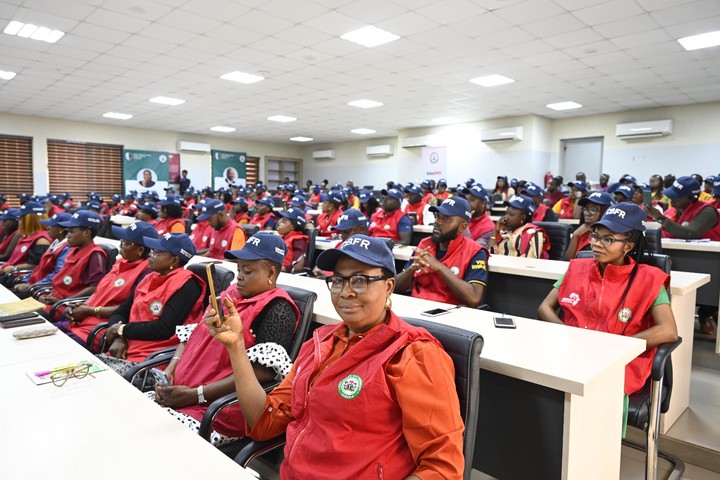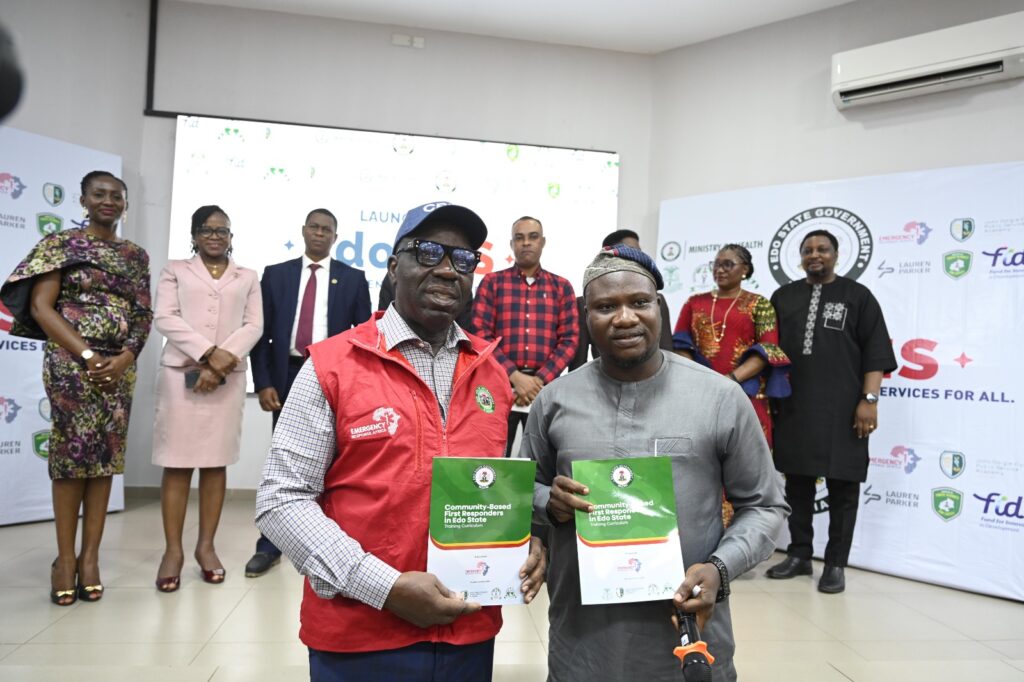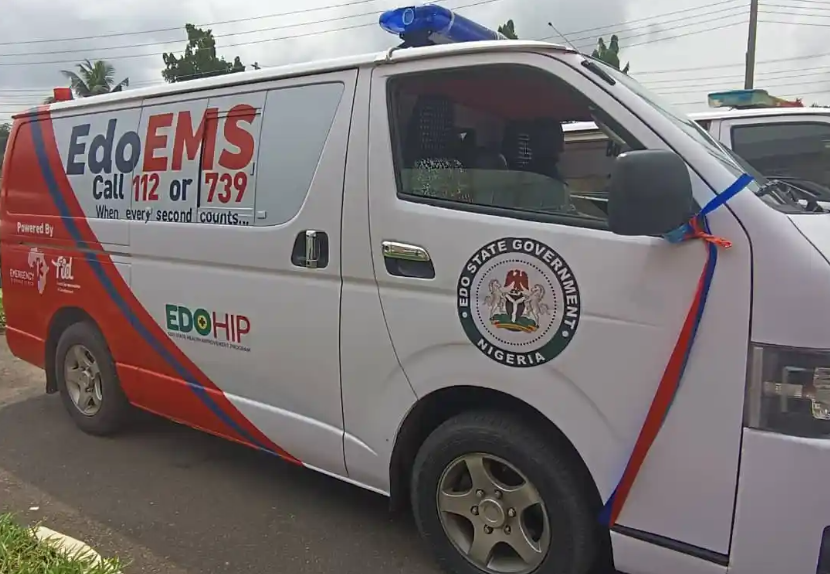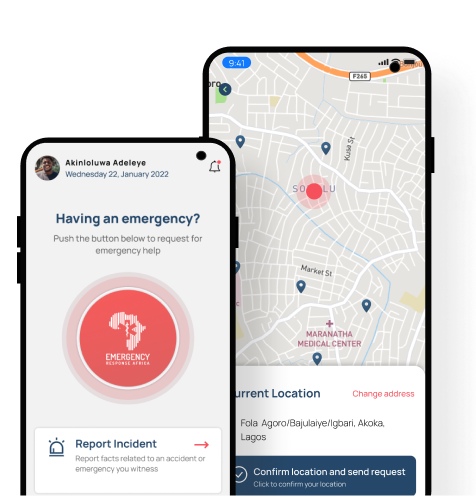In a groundbreaking initiative aimed at advancing healthcare and fulfilling Sustainable Development Goal 3 (SDG 3), the Edo State Government, under the leadership of Governor Godwin Obaseki, launched the Edo Emergency Medical Services Project (Edo EMS) on March 5th, 2024. This pilot phase marks a collaborative effort between the Edo State Government, the Fund for Innovation in Development (FID), and Emergency Response Africa, a forward-thinking healthcare technology organization.
The Edo EMS project is designed to revolutionize emergency medical care across Edo State, providing rapid and reliable services, particularly in underserved and remote areas, through the strategic deployment of technology. A cornerstone of the initiative is the training and capacity building of Community-Based First Responders (CBFRs) to enhance local healthcare support services.
Governor Obaseki emphasized the government’s commitment to delivering high-quality healthcare during the launch, underscoring the project’s potential to reduce preventable deaths from road accidents and sudden illnesses and improve emergency obstetric care.

Table of Contents
ToggleKey Achievements
- CBFRs Training Commencement: Training for 135 CBFRs began on March 8th, 2024, and concluded with practical sessions on March 18th.
- Graduation of CBFRs: The inaugural batch of CBFRs graduated on March 20th, 2024, with Governor Obaseki highlighting the critical role they will play in the healthcare system.
- Project Kick-off: The Edo EMS officially commenced operations on April 1st, 2024, following a comprehensive two-week simulation program.
- Second Batch Training: Training for an additional 35 CBFRs began on April 22nd, 2024, increasing the total number of trained responders to 170.
- Collaboration with Primary Healthcare Centers: Ambulance bases were established at Ugbeku PHC, Arougba PHC, and the Command-and-Control Centre, ensuring that emergency medical services are accessible within a 10-minute timeframe.
This initiative promises to transform the healthcare sector in Edo State, significantly lowering the rate of preventable deaths and ensuring that residents have access to timely and reliable emergency care.
Introduction
Health is a fundamental human right, with the quality of life heavily dependent on access to quality healthcare. According to the National Health Service (NHS) of the United Kingdom, a medical emergency is a life-threatening illness or accident requiring immediate intensive treatment. In developing countries like Nigeria, the emergency healthcare system faces numerous challenges, including inadequate infrastructure, insufficient training, and high costs.
In Nigeria, approximately 54% of deaths could be prevented with timely emergency medical response. Poor emergency services contribute to 1.2 million preventable deaths annually, often caused by cardiovascular conditions, road accidents, and maternal health issues. The Edo EMS project, spearheaded by the Edo State Government, aims to address these challenges by improving emergency medical care and increasing public trust in the healthcare system.
Objectives
The primary objective of the Edo EMS initiative is to transform healthcare and emergency response in Edo State. Additional goals include improving emergency response times, reducing preventable deaths, and promoting enrollment in the Edo State Health Insurance Scheme to increase health insurance adoption across the state.
Project Description
The first phase of the Edo EMS project focuses on implementing a technology-enabled Community-Based First Responders program in Oredo, Egor, and Ikpoba-Okha Local Government Areas. Community members were selected and trained as first responders, utilizing Emergency Response Africa’s proprietary technology platform. The project, which began in October 2023 and officially kicked off in December 2023, is set to run for 15 months, concluding in December 2024.
Key stakeholders include Emergency Response Africa, the Fund for Innovation in Development, the Edo State Government, various state ministries, and leading public and private healthcare facilities.
Methodology
The Edo EMS operates through toll-free numbers 112 (Federal) and 739 (Edo State), which are connected to the Command and Control Centre. Trained agents at the Control Centre receive emergency calls and dispatch nearby first responders to provide first aid and manage the situation until an ambulance arrives if needed.
Community-Based First Responders were selected through a rigorous nomination and selection process across each local government area within the pilot regions. They underwent a comprehensive six-day training program, which included practical drills and live simulations of emergency scenarios.

Challenges and Solutions
Implementing Community-Based First Response and Emergency Medical Services in Edo State presented several challenges, including cultural biases against the use of ambulances, inadequate talent, data shortages, and the risk of technology or communication failures.
To address these challenges, the project team implemented contextual promotional campaigns, community-based recruitment, thorough pre-project assessments, and relevant capacity building. Extensive training programs were also provided to ensure the safety and efficiency of first responders.
Results and Impact
The Edo EMS project has had a significant impact on emergency medical care in Edo State. Public awareness about Edo EMS services has increased, with about 20-30 cases being attended to each week. The efficient handling of recent emergencies, including a teenager’s collapse on Siluko Road and assistance during flooding incidents, has garnered praise from residents.
The project has also driven enrollment in the Edo Health Insurance Scheme, ensuring the financial sustainability of the initiative. The joint efforts of EMS staff, CBFRs, and community members have demonstrated a commitment to improving emergency medical care in Edo State.
Case Studies
Case Study 1: Victim’s Experience A teenage boy collapsed at Siluko Road, Egor LGA. Emergency services were contacted, and CBFRs arrived within minutes. The paramedics provided immediate care and transported the patient to the nearest health center. The professionalism and empathy shown by the responders significantly reduced anxiety during the crisis.
Case Study 2: First Responder’s Experience A CBFR highlighted the importance of clear communication and efficient resource management during an emergency response. Real-time traffic data provided by the dispatch center helped the responders navigate to the scene quickly.
Case Study 3: System Improvements The introduction of an advanced dispatch system and improved communication protocols has resulted in quicker response times and more efficient use of resources. Additionally, mental health support resources for first responders have been implemented to address the stressful nature of their work.
READ MORE
Lessons Learned
Key Insights:
- Efficient Communication Channels: The use of advanced communication systems, including real-time dispatch information, has significantly improved response times and coordination among teams.
- Training and Preparedness: The comprehensive training provided to CBFRs and paramedics ensured that they were well-prepared to handle various emergency scenarios.
- Collaborative Approach: Collaboration with key stakeholders facilitated a smooth transition of care and resource allocation.
Areas for Improvement:
- Data Integration and Sharing: There is a need for better integration of data from different sources to streamline patient care.
- Mental Health Support: Enhanced mental health support for first responders is necessary to prevent burnout.
- Public Awareness and Education: Increasing public awareness about the EMS system and its appropriate use is crucial for the project’s success.
Recommendations
Given the success of the Edo EMS pilot phase, it is recommended that the project be extended across the entire state and eventually nationwide. Additionally, increased outreach efforts, including regular radio engagements and awareness walks, should be conducted to educate and inform the public about the available emergency response services.
Conclusion
The Edo EMS project has effectively leveraged technology to revolutionize emergency medical care in Edo State, setting a new standard for fast and reliable medical emergency services that save lives, particularly in underserved areas. As we continue to innovate and expand our reach, we are eager to collaborate with government entities at all levels to further enhance emergency response capabilities across Nigeria and beyond. If you’re interested in partnering with us, please reach out to us via contact@emergencyresponseafrica.com
RELATED SERVICE



